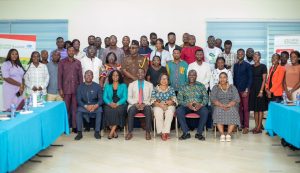The Noguchi Memorial Institute for Medical Research, University of Ghana, has given eight weeks intensive training to laboratory technicians and scientists from 12 African countries in detecting, managing and preventing infectious and contagious diseases including COVID-19.
Participants were equipped with knowledge and skills in Virology, Bacteriology, and Parasitology and were also trained on how to detect the Coronavirus (COVID-19) infection in their respective countries.
The eight-week training programme organised by the Institute in partnership with the Japan International Cooperation Agency (JICA), also sought to enhance the laboratory skills of participants for infectious diseases especially after the outbreak of Ebola.
Participating countries were Ghana, Nigeria, Sierra Leone, Liberia, Niger, Senegal, Guinea, La Cote d’Ivoire, Burkina Faso, Benin and Togo.
Professor Abraham Kwabena Anang, the Director of the Institute, said Africa, especially West Africa had to be alert to live up to expectations in fighting infectious diseases.
To accomplish that, he said, the region had to strengthen its health systems, which he believed was not resilient or strongly positioned, to be able to withstand emerging and re-emerging infections.
Prof. Anang expressed optimism that the partnership with JICA was going to help build critical and innovative capacities of the represented countries, stressing that the training had been well structured to deliver a targeted effectiveness to help diagnose, mentor, and deliver on surveillance in African countries.
Ozawa Maki, a Senior Representative of JICA, Ghana Office, for her part said although the COVID-19 had not widely spread across West Africa, it was inevitable to strengthen the sub-regional response and preparedness for public health emergencies.
She advised the trainees to bear in mind the important role collaboration and coordination played in addressing health emergencies, and resort to sharing information and working in a team to achieve their goals.
Hiromoto Oyama, the Deputy Chief of Mission, Embassy of Japan in Ghana, said one of the priorities of the Japan Government, was to ensure the existence of human security in Africa through capacity building programmes.
He encouraged the trainees to let their individual countries benefit from the knowledge they had acquired by contributing to public health.
Some of the trainees expressed their gratitude to the institute and its partners and gave an assurance to employ the knowledge they had acquired to the benefit of their homelands and neighbouring countries.









